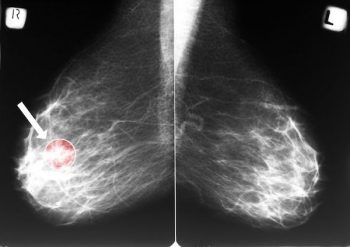By Sayer Ji
Contributing writer for Wake Up World
Millions equate a breast cancer diagnosis with a possible death sentence, doing anything from removing their breasts (and ovaries) with added radiation and chemotherapy treatments, when, in fact, the truth is much more forgiving.
A powerful case study and literature review published in the International Journal of Clinical and Experimental Pathology from 2014 highlights a phenomenon which is rarely if ever acknowledged by the conventional medical establishment, namely, a case of the spontaneous regression of breast cancer with distant lymph node metastasis.
A 52-year old female was diagnosed with a lump in her left breast which had spread metastically to a distant lymph node (armpit area). Before surgery she was found to have severe type 2 diabetes, and was treated with insulin until her high blood sugar normalized, a month later. She then underwent surgery on her left breast. Her post-surgery examination revealed the spontaneous regression of breast cancer both at the primary site and the metastatic lymph node in her armpit.
Furthermore, immunohistochemical studies found that the woman’s estrogen receptor positive, AE1/AE3-positive ductal carcinoma,
“… completely underwent necrosis associated with extensive infiltration of CD3-positive T cells in the tumor nodule in the lymph node. In addition, primary ductal carcinoma cells also underwent single cell necrosis with infiltration of T cells with lymph follicle-like organization of B cells in the mammary gland. The features were suggestive that the tumor eradication in the metastatic lymph node and regression of the primary ductal carcinoma could be due to host T cell response to the ductal carcinoma. As far as we know it is the first report that shows the spontaneous regression of breast cancer, probably due to the spontaneously-induced T cell response.”
What makes this report so provocative is how it challenges deeply held assumptions within the conventional perspective on cancer and standard of care. For instance, chemotherapy and radiation are almost invariably highly toxic to the patient’s immune system; even those drugs which are focused on improving or replacing the patient’s immune response, such as the ‘immunotherapy’ drug Yevoy, which costs 4,000x more by weight than gold and has lethal side effects. Were the patient’s innate immune response considered important in combating cancer, most of the drugs and conventional cancer-fighting approaches used today would be contraindicated. Additionally, immune supportive approaches related to mind-body practices, nutrition, dietary supplements, exercise, familial and interpersonal support systems, and other lifestyle factors would be prioritized.
Indeed, this case report, like others, reveals that spontaneous regression of breast cancer can be accomplished through an innately-articulated adaptive immunological response.
Powerful Meta-Analyses of the Breast Cancer Literature Show Spontaneous Regression of Tumors Not Uncommon
Case reports are only individual cases. Isn’t spontaneous regression of breast cancer exceedingly rare? Not necessarily.
In fact, all the way back in 2011, I reported on a powerful meta-analysis published in Lancet Oncology that found invasive breast tumors often spontaneously regress when undiagnosed and untreated. Titled “Natural history of breast cancers detected in the Swedish mammography screening programme: a cohort study,” the following conclusions were made:
“Because the cumulative incidence among controls did not reach that of the screened group, we believe that many invasive breast cancers detected by repeated mammography screening do not persist to be detected by screening at the end of 6 years, suggesting that the natural course of many of the screen-detected invasive breast cancers is to spontaneously regress.”
In a previous published analysis, these same scientists reference the Wisconsin Breast Cancer Epidemiology Simulation Model, as additional evidence for the spontaneous regression of breast cancer in ~40% of initiated breast cancers:
“[Wisconsin Breast Cancer Epidemiology Simulation Model]…uses a stochastic simulation to replicate breast cancer incidence and mortality rates in the US population during the period 1975 through 2000, when screening was introduced. To fit the observed statistics, it was necessary to postulate that approximately 40% of initiated breast cancers fell in a class of so-called limited malignant potential, ie, tumors that “progress to a maximum of approximately 1-cm diameter, dwell at this size for 2 years, and then regress if undetected.”
Consider also that we have spent the past decade focusing on the non-malignancy of commonly diagnosed ‘breast cancers’ such as ductal carcinoma in situ, which sadly are still treated today as though life-threatening if not lethal. The standard of care for DCIS often relies on highly aggressive and often traumatic procedures, including radiation, chemotherapy, lumpectomy and mastectomy. This, despite the National Cancer Institute’s expert panel findings that DCIS should be reclassified as a “benign or indolent lesion of epithelial origin.” Estimates are that over 1.3 million women had their breasts unnecessarily treated and/or removed in the past three decades due to the aggressive overuse and misuse of mammography screening programs, and a fundamental misunderstanding in breast physiology and pathology.
The takeaway here is to be exceedingly careful of overdiagnosis and overtreatment, as well as with accepting uncritically the prognoses of the conventional medical system which are so powerful that they create something of a curse (medical hex) and/or self-fulfilling prophecy. When we outsource our power to the physician like some kind of white-robed priest-of-the-body, and forget that our bodies have extraordinary capability to heal themselves– yes, even cancers — we forgo an opportunity to address and resolve the root causes of our symptoms, which is the real art and science of a humane, enlightened medicine. The key is acknowledging that spontaneous regression (which is to say, immune-mediated regression) of breast cancer — or any disease — can only be made possible if one chooses to facilitate that process. The standard of care, as it’s called, is actually similar to the Bush era war doctrine of preemptive war. Within this fear- and aggression-based model, a suspicious tissue is considered and treated equivalently to a malignant one, and is targeted for destruction, often using — ironically and poetically — weapons grade chemical and radiation technology.
In contradistinction, a precautionary, informed consent model requires that newly diagnosed patients be aware of the true risks and benefits associated with an intervention, including even diagnostic procedures which carry their own significant risks, especially in the case of x-ray mammography which can plant the radiobiological seeds of cancer within the very patient it is trying to prevent and detect early. We believe the power and the choice to decide your health destiny should be entirely yours. Please use the resources on GreenMedInfo.com to inform and enrich your perspective on the topic by visiting our Breast Cancer Research and Mammography page, as well as the following articles:
- Is Lymph Node Removal with Cancer Surgery Really Necessary?
- Mammograms Linked To An Epidemic of Misdiagnosed Cancers
- 30 Years of Breast Screening: 1.3 Million Wrongly Treated
- Millions Fall Prey To This Deadly Breast Cancer Myth
- Covering Up The Causes of Breast Cancer Since 1985: AstraZeneca’s BCAM
- The Dark Side of Breast Cancer (Un)Awareness Month
Recommended articles by Sayer Ji:
- If Cannabis Can Kill “Incurable” Brain Cancer, Why Is It Criminalized?
- The Powerful Aspirin Alternative Your Doctor Never Told You About
- 13 Evidence-Based Medicinal Properties of Coconut Oil
- Group Drumming Better Than Prozac, Study Suggests
- 25 Cancer Stem-Cell Killing Foods That Are Smarter Than Chemo and Radiation
- How Pomegranate Puts Chemo and Radiation to Shame
- How Turmeric Can Save the Aging Brain From Dementia and Premature Death
- Dramatic Recovery in Parkinson’s Patient with Gluten Free Diet
- 6 Bodily Tissues That Can Be Regenerated Through Nutrition
- Fluoride Literally Turns the Pineal Gland to Stone, Research Suggests
- Why All Diabetics Should Know About Turmeric
- Wheat Contains Not One But 23K Potentially Harmful Proteins
About the author:
Sayer Ji is the founder of Greenmedinfo.com, a reviewer at the International Journal of Human Nutrition and Functional Medicine, Co-founder and CEO of Systome Biomed, Vice Chairman of the Board of the National Health Federation, and Steering Committee Member of the Global Non-GMO Foundation.
For more, visit GreenMedInfo.com and Facebook.com/GreenMedInfo, or sign up for GreenMedInfo’s free e-Newsletter.
© January 9th, 2019 GreenMedInfo LLC. This work is reproduced and distributed with the permission of GreenMedInfo LLC. Want to learn more from GreenMedInfo? Sign up for their newsletter here.

If you've ever found value in our articles, we'd greatly appreciate your support by purchasing Mindful Meditation Techniques for Kids - A Practical Guide for Adults to Empower Kids with the Gift of Inner Peace and Resilience for Life.
In the spirit of mindfulness, we encourage you to choose the paperback version. Delve into its pages away from screen glare and notifications, allowing yourself to fully immerse in the transformative practices within. The physical book enriches the learning process and serves as a tangible commitment to mindfulness, easily shared among family and friends.
Over the past few years, Wake Up World has faced significant online censorship, impacting our financial ability to stay online. Instead of soliciting donations, we're exploring win-win solutions with our readers to remain financially viable. Moving into book publishing, we hope to secure ongoing funds to continue our mission. With over 8,500 articles published in the past 13 years, we are committed to keeping our content free and accessible to everyone, without resorting to a paywall.








